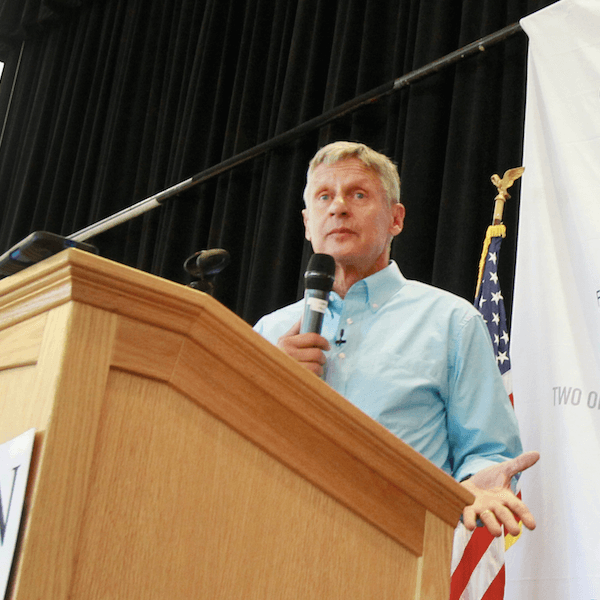The Gary Johnson student debt plan aims to cut federal student loan funding in order to lower the cost of education.
From the Libertarian Party candidate’s point of view, nothing in life comes free, so he doesn’t think college should be either. Still, he would leave it up to states to decide whether or not to make it so.
The Bennett hypothesis
Johnson and others who ascribe to the “Bennett hypothesis” believe that federal student loans are responsible for rising tuition rates. Basically, the government guarantees loans to people who demonstrate need, which enables institutions to raise their tuition rates, since the government will foot part of the bill up front. More people are able to go to college, but they’ll have to pay for it later.
There’s some support for this hypothesis, including a report released by the Federal Reserve Bank of New York in 2015 and revised this March. The report noted that institutions raised sticker prices about 60 cents on the dollar when their subsidized loan standards increased.
From 2001 to 2012, the report states, tuition rose 46 percent. During that time, student lending increased from $53 billion to $120 billion, with 90 percent of that coming in the form of federal aid. The Bennet hypothesis attributes the former fact to the latter.
To Johnson, the Bennett hypothesis is a big fat “duh.” He told International Business Times:
If guaranteed government student loans never existed, tuition today would be half of what it is, because colleges and universities would have to go out and attract you as a student. And they would have to be as effective and efficient as everything else in our lives.
In typical Lib fashion, Johnson wants the government out of education, and to create a situation in which colleges and universities must make smart business decisions in order to compete for students.
Then again …
Would ending federal student loan programs really lead to colleges slashing tuition in half? The Bennett hypothesis has its naysayers, and they’ve got some research up their sleeves that counters the Federal Reserve Bank of New York’s report.
In June, the Institute for College Access & Success released a statement that quoted several economists who say that the connection between federal student aid and rising tuition rates cannot be determined, and cited studies that conclude it can’t be.
It should be noted that the Congressional Research Service review of studies cited in the statement was mostly concerned with federal grants, not student loans. Also, the National Center for Education Statistics study looked at aid and tuition rates for the ‘80s and ‘90s, meaning it didn’t take into account the recent increases in both areas.
Other explanations
Increasing access to federal student loans isn’t the only possible explanation for higher tuition. In 2014, NPR explained that, when the economy is rough, states spend less on education. States have reduced their investment in higher education over the past few decades, and particularly around the Great Recession, meaning that the money has to come from somewhere else. Enter higher tuition rates, so that money will come from students (that is, in many cases, their loans).
Colleges are also spending way more money on administrative staff these days – the number of these staffers, from mental health professionals to fundraising teams to financial aid folks, has more than doubled in the past 25 years, outpacing increases in students and faculty.
Takeaway
When it comes down to it, the causes for increased tuition rates is a heavily contested area, with evidence and counter evidence from both sides. But Johnson is convinced that increased access to federal student loans is the main culprit behind schools raising their rates. In turn, he wants to get government out of the game and allow free market competition to control the cost of higher education.
Have something to add to this story? Comment below or join the discussion on Facebook.
Header image: Getty









































